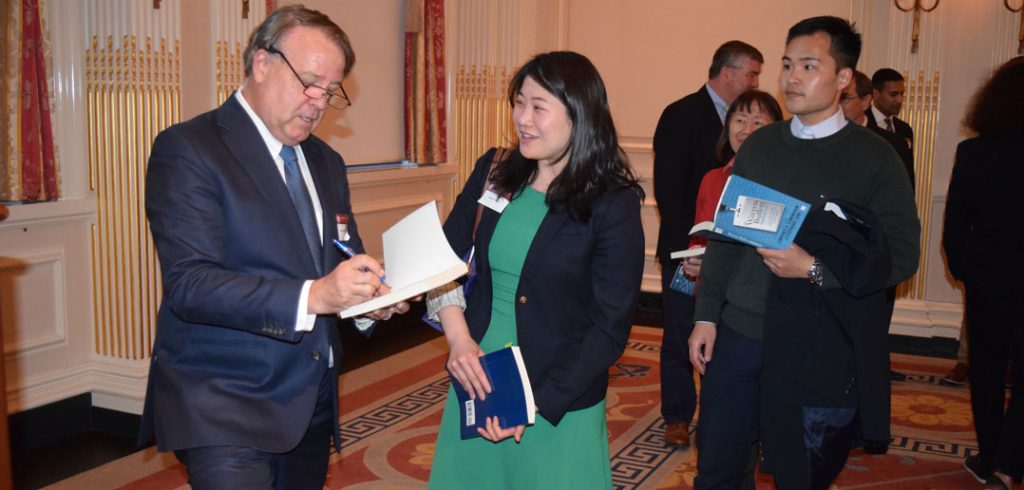Not so for Warren Buffett. To the CEO of Berkshire Hathaway, says the author Lawrence Cunningham, the more indispensable companies have names like Chuck Akre, Tom Gayner, Ingrid Hendershot, and Tom Russo.
Those four are among thousands of Berkshire investors who have helped sustain the culture of integrity and trust Buffett has cultivated at the hugely successful Omaha, Nebraska-based conglomerate he has led since 1970—and with which he will forever be linked.
During a University Club talk on April 23 sponsored by the Gabelli Center for Global Security Analysis and the Museum of American Finance, Cunningham suggested that the foundation of Berkshire’s success can be traced to characteristics associated with the root definition of company, derived from the Old French compaignon, meaning that person with whom one breaks bread.
“It’s a family, it’s a community, it’s a culture, it’s a group,” Cunningham, a professor at the George Washington University Law School and author of The Essays of Warren Buffett, said of Berkshire’s investor collective. “That’s the culture that Warren built.”
Cunningham’s new book, The Warren Buffett Shareholder, co-edited with his wife, Stephanie Cuba, is a compendium of essays in which 43 Berkshire shareholders, including Cunningham, discuss how and to what effect Berkshire reflects Buffett’s unique corporate philosophy, and how that thinking helped build a singularly prosperous firm.
Much of that thinking is distilled at Berkshire’s renowned annual spring meeting of shareholders, which Cunningham in the book likens to “a pilgrimage of kindred spirits,” that draws upward of 40,000 people to Omaha.
Subtitled “Stories from inside the Berkshire Hathaway Annual Meeting,” the book’s contributors suggest that Berkshire’s ethos can be traced to Buffett’s insights into leadership culture, namely that a decentralized, non-hierarchical corporate mindset, otherwise uncommon in American companies, engenders prosperity. That philosophy is built not on abstruse microeconomic theory, but on people.
“Mostly he’s found managers of high character and strong talent,” Cunningham explained. The result is trust, which allows decision-making within dozens of Berkshire’s subsidiaries, from See’s Candy to Geico to Fruit of the Loom, to be left to those most intimate with the asset.
“Autonomy actually promotes accountability,” Cunningham said.
That autonomy and permanence—Berkshire hasn’t sold a subsidiary in 40 years, Cunningham said—has over the years convinced shareholders that leanness and simplicity are the means to endure and to flourish.
“We think Berkshire shareholders love the economic returns—we certainly do—but they equally love these cultural aspects. And the two are closely related: Berkshire’s economic success owes a great deal to its very special culture and that very special culture owes a great deal to its shareholders, and so it’s a virtuous circle,” Cunningham said.
That culture replicates, he said. “Berkshire blood,” he noted, flows through investors’ collective veins.
But with Buffett approaching 90, and Berkshire’s vice chairman, Charles Munger, in his mid-90s, questions of succession are becoming more pronounced, Cunningham said.
Earlier this year, the Berkshire board elevated two Berkshire colleagues, Ajit Jain and Greg Abel, long thought as possible successors to Buffett, to vice chairmen. Despite being “excellent choices,” Cunningham said, both will have to cultivate important collaborators if Berkshire’s singular culture is to persist.
“They will need the kinds of shareholders that Buffett has attracted for decades,” Cunningham said of Jain and Abel. “Our thesis is that the Warren Buffett shareholder is as important to the future of Berkshire Hathaway as is whoever is named as Warren Buffett’s successor.”
A willingness and a desire to break and share bread, in other words, will be as vital as a stellar resume.
–Richard Khavkine

